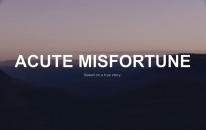 1685594423147055225.jpg
1685594423147055225.jpg
 1685594423147055225.jpg
1685594423147055225.jpg
'When 19-year-old wunderkind journalist Erik Jensen (now editor of The Saturday Paper) was invited by bad-boy Australian painter Adam Cullen to write his biography, Jensen (Toby Wallace, Romper Stomper) jumped at the chance. Despite a turbulent relationship, the two formed a unique bond that lasted until Cullen’s death in 2012 aged just 46.'
Source: Melbourne International Film Festival, 2018.
'Thomas M. Wright’s Acute Misfortune, based on Erik Jensen’s biography of artist Adam Cullen, explores both the destructive masculinity upon which Cullen built his personal mythology, and the way Australian culture romanticises blokey dysfunction.' (Essay summary)
'Writer Erik Jensen and film-maker Thomas M Wright fought ‘tooth and nail’ on the adaptation – and called in Christos Tsiolkas to mediate.'
'On the eve of the release of his directorial debut, Acute Misfortune, adapted from Erik Jensen’s book about artist Adam Cullen, Thomas M. Wright talks about how his reaction to Cullen turned from revulsion to deciding he was the perfect subject. “Adam seemed to stand for so many things that I just can’t. And I think, particularly, cloaking that behaviour and those attitudes behind a veil of art is just fucked.”.' (Introduction)
'This essay makes a case for considering the depiction of the artist Adam Cullen in Erik Jensen's biography of him, Acute Misfortune, as good grounds for rethinking the political potential of Cullen's art. This is especially clear in Jensen's treatment of Cullen's own self-estimation of occupying a special, existentially free, political space in which he could use his art to show the less attractive side of neo-liberal and mundane middle-class life. Jensen shows, through a careful and literary retelling of significant events in the final years of Cullen's life, that the freedom he claimed to possess might more accurately be described as serving the agenda of neoliberalism, in which the works of the troubled artist were collected as decorative pieces. While not underestimating the force of Cullen's oeuvre, Jensen points to an interesting and unintended consequence of Cullen's art, noticeable at his funeral, that the extreme actions of the enfant terrible did more to create lasting human connections than it did to separate them. The biography thus speaks against the power of art to create new political spaces and yet simultaneously celebrate Cullen's art for showing us our own flawed psyches.’ (Introduction)
'This essay makes a case for considering the depiction of the artist Adam Cullen in Erik Jensen's biography of him, Acute Misfortune, as good grounds for rethinking the political potential of Cullen's art. This is especially clear in Jensen's treatment of Cullen's own self-estimation of occupying a special, existentially free, political space in which he could use his art to show the less attractive side of neo-liberal and mundane middle-class life. Jensen shows, through a careful and literary retelling of significant events in the final years of Cullen's life, that the freedom he claimed to possess might more accurately be described as serving the agenda of neoliberalism, in which the works of the troubled artist were collected as decorative pieces. While not underestimating the force of Cullen's oeuvre, Jensen points to an interesting and unintended consequence of Cullen's art, noticeable at his funeral, that the extreme actions of the enfant terrible did more to create lasting human connections than it did to separate them. The biography thus speaks against the power of art to create new political spaces and yet simultaneously celebrate Cullen's art for showing us our own flawed psyches.’ (Introduction)
'On the eve of the release of his directorial debut, Acute Misfortune, adapted from Erik Jensen’s book about artist Adam Cullen, Thomas M. Wright talks about how his reaction to Cullen turned from revulsion to deciding he was the perfect subject. “Adam seemed to stand for so many things that I just can’t. And I think, particularly, cloaking that behaviour and those attitudes behind a veil of art is just fucked.”.' (Introduction)
'Writer Erik Jensen and film-maker Thomas M Wright fought ‘tooth and nail’ on the adaptation – and called in Christos Tsiolkas to mediate.'
'Thomas M. Wright’s Acute Misfortune, based on Erik Jensen’s biography of artist Adam Cullen, explores both the destructive masculinity upon which Cullen built his personal mythology, and the way Australian culture romanticises blokey dysfunction.' (Essay summary)